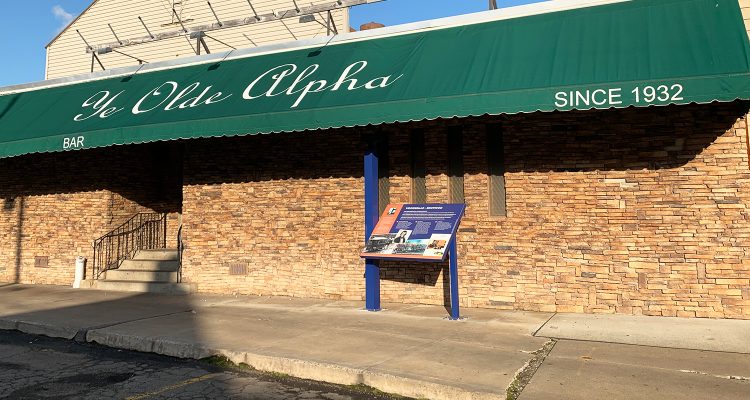Editor’s note: With the recent closing of Ye Ole Alpha on Carmel Road, memories are coming out of the woodwork! Here, writer Bill Hogan muses about the early years. We invite our readers to use the form at the end of this story to share their own memories of the beloved bar and restaurant.
Prohibition ended in December of 1933. It was a federal ban on alcohol and was unenforceable. I am guessing that was the reason Ye Olde Alpha opened in 1932.It is said that alcoholics simply lack willpower. If you want to see willpower, try to keep a thirsty alcoholic from getting a drink. I doubt that prohibition put a dent in the drinking culture of our-shot-and-a-beer, martini and sidecar town.
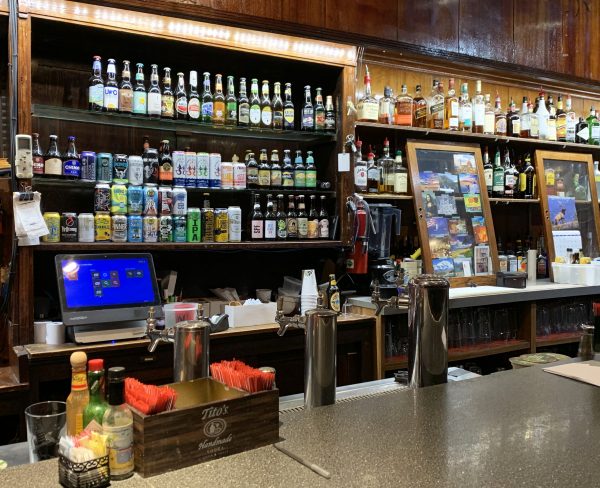
I remember stories about Uncle Lee, my dad’s brother who lived in Pittsburgh, who fancied himself a talented brewmeister and how his visits were dreaded. He would make beer in our basement, bottle it and stock the shelves in the fruit cellar. Mother would carefully keep count of the number of bottles on a pad kept in the kitchen, and lock the fruit cellar door after he returned home. Then, the long count of exploding bottles until folks could go in and clean up the mess.
I heard the Alpha was opened by the Brennan brothers and Tom Emmerth. This is according to one of the brothers I would bump into at the Continuous Care Center who went every day to feed his wife her meals. They were both in their 90s. Tom, of course, left and opened the famous “Tom’s” on Edgington Lane after World War II.
GENERATIONS OF MEMORIES
Memories of the Alpha depend on the age of the individual because it has morphed through a number of different stages. It is sort of like the President’s motto, MAGA, which is undefined.
To me, America was the greatest in the 1950s.
I had graduated from college, a small miracle, and completed five and a half years in the military, entering as an enlisted man and coming out as a first lieutenant, hitchhiking on the respect for the courage and valor of our troops who fought and won the “War to End All Wars.”
I had a good job, learning, with great interest, the business, and I had married the girl of my dreams. I was at the top of my game, bulletproof, and the world was my oyster. In my mind, the Alpha was the most interesting or colorful in the ’50s when I was in my 30s.
In my teens, our gang would sneak in the back door and shoot pool until Pete, [owner] Frank Miller’s No. 1 man, would throw us out very physically and unceremoniously. That was why it was such a great “dare.”
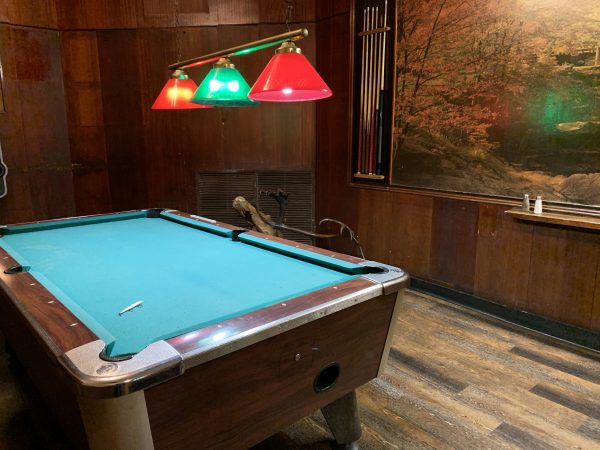
But my “Alpha Days” really started in the late ’40s when I embarked on my career as a juvenile delinquent of sorts.
When I was 17 or 18, we started to be grownups and drink beer. There were a number of reasons: Wheeling was wide open, the law was not an impediment to sampling all the vices, children were often given small glasses of beer and wine at the gatherings around the kitchen table, and the downtown was alive at night especially South of the Creek, lit up like a Christmas tree. It was our culture. The out-the-Pike crowd did the same only with mixed drinks in special glasses.
The Alpha at that time was strictly stag, a workingman’s bar. Ladies simply did not go there. Cuspidors were strategically placed on the floor down the bar. There were gallon jars on the bar with pickled hard-boiled eggs and pigs’ feet. Of all the unknown stuff I have eaten around the world, I never got drunk enough to eat pickled pigs’ feet. The kitchen was a grill on the back bar that grilled the hamburgers made of top-grade beef, a slice of onion and hot mustard made with stale beer. A ham was held in a stainless steel rack that facilitated carving for sandwiches on rye. Once the ham was down to about a third, the bone was thrown into a big pot for a man’s type of bean soup.
There was a small narrow room next to the bar with cribbage scoring blocks and euchre decks at the ready on the tables. These men were like a club within a club. The main topics of discussion in the bar were hunting and fishing with some sports thrown in.
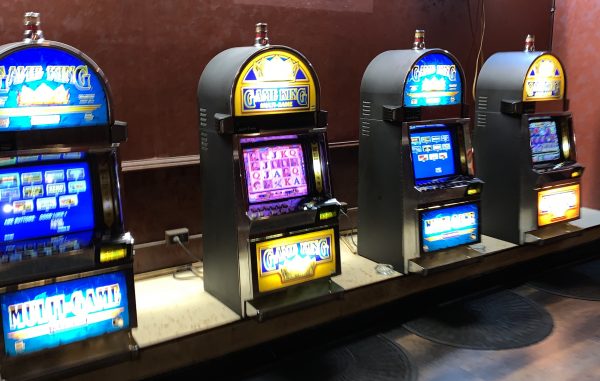
The Hixenbaughs, father and son, were the main bartenders. Mary Ann, my wife-to-be, was perhaps, the first woman to order a drink at the bar. Hixie asked her if she was any relation to Agnes Hess, a spinster who lived on North Main Street.
She replied, “Yes, she is my great aunt, we call her Tante Ag (Aunt Agnes).” Hixie told her he would never forget her. In those days during the Great Depression, It was customary for the gentry to give Chrismas gifts to the poor workingmen. As Hixie said, he was her garbage man and was paid some paltry sum and all he could eat. Her great aunt had given him two white dress shirts!
The whole place was covered in layers of cigarette and cigar smoke. At quitting time, the bar would be three and four men deep and, while there was a lot of drinking, I never heard of any fights [at the bar]. Like other well-run bars, the bartenders were hired for their physical power, and all were formidable-looking men.
In the back was the poker room where the two games were five-card draw and five-card stud. The house took a cut from the pot, and the opener passed with each hand around the table. Early one morning, a fight broke out where the pool tables are now — with thuds against our wall, chairs being thrown and crashing against the wall separating the poker room. We were afraid to go out of the room. Babe called on the intercom. “Frank (Miller, the proprietor), there’s a hell of a fight out here, do you want me to call the cops?“
This was a dicey situation with the place being open after hours, selling illegal booze (we were a dry state then) and beer after legal hours. Frank, always cool, told Babe “Tell them to keep it down,” and continued to deal.
BABE’S ERA
This was the era of Babe Hirt, a bald redhead, a chaw pushing out one cheek, stubbly built with his apron wrapped around and tied above his paunch. He was “The Man” who decided who was taken care of next at the overcrowded bar. One of the Mead boys was home for a visit from New York. With him was a proposed partner for a bar they intended to open in Manhattan.
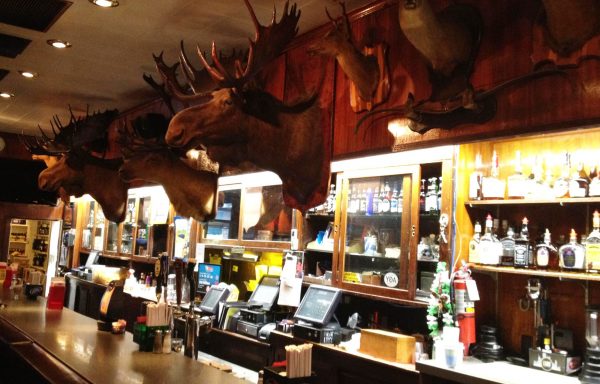
Settled at the bar, Babe took their order, a bottle of Fort Pitt beer, and a dry martini with a twist for the New Yorker. Because we were a dry state, all the liquor was out of sight in cupboards in the back bar. For a few minutes, Babe went through the cupboards examining the label on each bottle, then he opened a bottle of Fort Pitt and placed it and a glass in front of the Mead fellow, then put both hands on the bar in front of the out-of-towner and, with authority, said to him, “We just ran out of dry martinis with a twist.” Babe’s expertise at mixed drinks extended no further than a shot with a beer chaser. The partner said the bar would be a rousing success if they could take Babe to New York.
Then there was Heasley who had a voice that sounded like coal going down a metal chute. He sat in the poker games anteing and always dropping out. The house provided free drinks to the players, and Hease figured it was cheaper than buying it. He would tie one on, lurch toward the door loudly complaining to Frank, “I’m going someplace where I can get decent scotch!” Frank then used the intercom to the bar: “Heasley is coming out, make certain you put him in a cab for home.” He loved to tell the young vets from the latest war, shouting in the bar that he had fought in the “Big War.”
Sitting at the far end of the bar like four birds on a telephone wire were Sid Wiseman, “Mac,” Tom O’Brien and Frank Miller drinking coffee. They did a lot more talking than drinking.
Mac had a hunting cabin up in Pennsylvania where he invited his buddies to hunt. They found gas on his property, and his cabin had central heat. These improvements changed his cabin to a “lodge.” Mac didn’t hunt but prepared a big breakfast for everyone and stood on the porch in his Abercrombie & Fitch hunting duds with a drink in one hand and waving goodbye with the other.
Tom’s son married the daughter of a pilot boat captain from Marseilles who made a visit to his daughter-in-law’s. Tom brought young Tommy and his French bride and her father to visit the Alpha, which was packed. Hease, walking awkwardly, bumped into Tommy’s father-in-law who very graciously said “pardon me” with a thick accent. Hease blurted out, “Are you, by any chance, French?” He replied with a big smile “ Yes sir, I am.”
Hease (of the “Big War”) replied in his normal booming voice, “If it weren’t for me, you’d be a German today,” and bumbled along. Tom immediately explained Hease’s behavior and an international incident was prevented at the Alpha.
MORE THAN A NEIGHBORHOOD BAR
The Alpha was more than a neighborhood bar. It was also a bank that cashed checks without a fee, loaned out fifths of booze, was a communications center — “No, Mrs. Black, Homer is not here,” as he winked at Homer who was vigorously shaking his head.
When Homer, “Ackie” aka Howard Atkinson, John Ruckman and I would go hunting, Frank would give the keys to Ackie who would cook up his buckwheat pancakes for our very early breakfast. When we were finished hunting, usually around noon or later, we would celebrate the “casing of the guns” with the first drink, then return to the Alpha to have lunch and celebrate our successful foray into the woods to scare hell out to a couple of grouse.
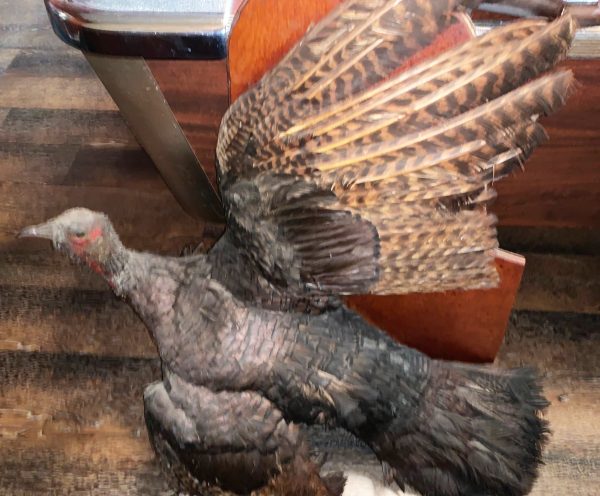 ‘DADDY’S CLUB’
‘DADDY’S CLUB’
I went over to the Alpha one Christmas to borrow a fifth of something. Frank unlocked the door and said, “Bill, you can’t come in, you have family.” Anyone who didn’t have family plus his employees and their families were welcome to eat and drink “on the house.” Frank and Lee Jones (the “house physician”) tended bar. I don’t know who did the kitchen chores.
There are so many stories like … the discovery of the angles above the false ceiling where the old movie theater once was … Arthur Fiedler of the Boston Pops always coming to the Alpha for a stiff drink and the French fries when in Wheeling … and the days of the chuck-a-luck and other table games.
Driving home from Mass at Saint Michael’s with the family, I went past the Alpha, and Peggy our oldest said, “Look, Mommy, there’s Daddy’s club!”
• Bill Hogan, born and raised in Wheeling, West Virginia, is a graduate of the University of Notre Dame and worked in the worlds of finance, real estate and alcoholism rehabilitation. Bill has six children and three grandchildren. He and his second wife, Susan Hogan, served in the U.S. Peace Corps from 1987-90 in Benin, West Africa. Now retired, he is a trustee of the Schenk Foundation, an artist, a writer and self-proclaimed “highly skilled dispenser of bull.”


